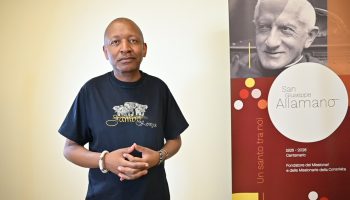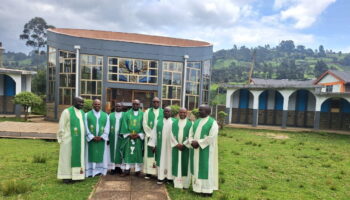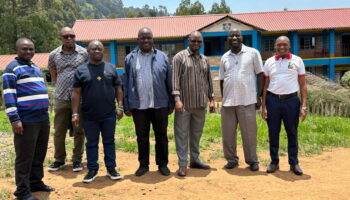
Around 30 Consolata missionaries working in formation in Kenya, Tanzania, Ethiopia, Congo DR, Mozambique, South Africa and Cote d’Ivoire took part in a course from 7th to 12th of July at Bunju, Tanzania. During the course programme, Fr. Mathew Ouma, IMC, offered a reflection on the meaning of vows in religious life, especially for those entrusted with the formation of future missionaries.
By Paulino Madeje *
In his presentation, Fr. Ouma emphasized that the vows of obedience, chastity, and poverty are far more than external commitments – they are a profound response to God’s love. This love, he insisted, must be the foundation of all formation work. After his presentation, group work followed to share views and contents on the same topic.
Fr. Mathew highlighted obedience as the central vow, with chastity and poverty serving as its tangible expressions. These vows are rooted in baptism, marking a moral and spiritual transformation that should be clearly visible in the life of a missionary, particularly in the face of real challenges in the mission field.

He also reminded formators of the essential qualities needed in community life: integrity, transparency, and authenticity. The vows are not to be worn as badges of identity or status but lived as humble witnesses. Formators must walk a delicate line – not becoming overly familiar with their formees, but instead loving them with a mature love that respects their freedom. In a digital age filled with distractions and false appearances, professionalism and grounded guidance are more important than ever.
Read also: Formators IMC in Africa reflect about self-awareness and leadership
Reflecting on the role of the Formator for the present time
Ultimately, the vows are not an end in themselves but a path guiding missionaries toward their final destination – heaven. Living them with authenticity and commitment is both the challenge and the witness expected of every true Consolata missionary.
From the groups discussions emerged interesting reflections. Formation in Africa is facing important challenges and opportunities that require a coordinated and context-sensitive approach. To address this, a Formators’ Continental Commission was proposed, bringing together representatives from across the continent to reflect on formation realities, adapt formation programs, and foster collaboration with the Missionary Animation Commission. Meetings would alternate between physical and virtual formats to ensure ongoing engagement.

The continent is experiencing a surge in vocations alongside economic difficulties. To sustain this growth, regions must mobilize resources through local benefactors, parish support, and ex-alumni, with Kenya and Tanzania leading by example. Balancing the number of seminarians with available resources is vital, and establishing a continental fund for formation is strongly encouraged.
Improving the quality of formation is crucial. There is a need for clear plans in selecting and preparing formators, with dedicated centers like CIU playing a key role. Formators should have strong spiritual formation, including training in the spirituality of consolation, and all candidates should achieve proficiency in English before entering novitiate to foster unity.
Formators currently face heavy workloads and often lack adequate preparation for modern formation challenges. Term limits should be respected, responsibilities balanced, and ongoing formation and rest prioritized. Identifying and training potential future formators from among seminarians is also recommended.

Recent discussions highlighted the importance of addressing contemporary issues such as drug abuse, psychosexual challenges, AI, digital media, and safeguarding the vulnerable. The workshop was well-organized overall, though participants requested more time for social interaction and noted some technical difficulties.
Additional recommendations included: increasing pastoral experiences for seminarians, setting clear dress codes, and involving vocation animators in future meetings.
In essence, formation in Africa must be collaborative, well-structured, and adapted to current realities, ensuring both growth and quality while supporting formators and responding creatively to the evolving needs of young missionaries and the Church.
* Father Paulino Madeje, IMC, Tanzania. Coordinator of Communication for Africa.



